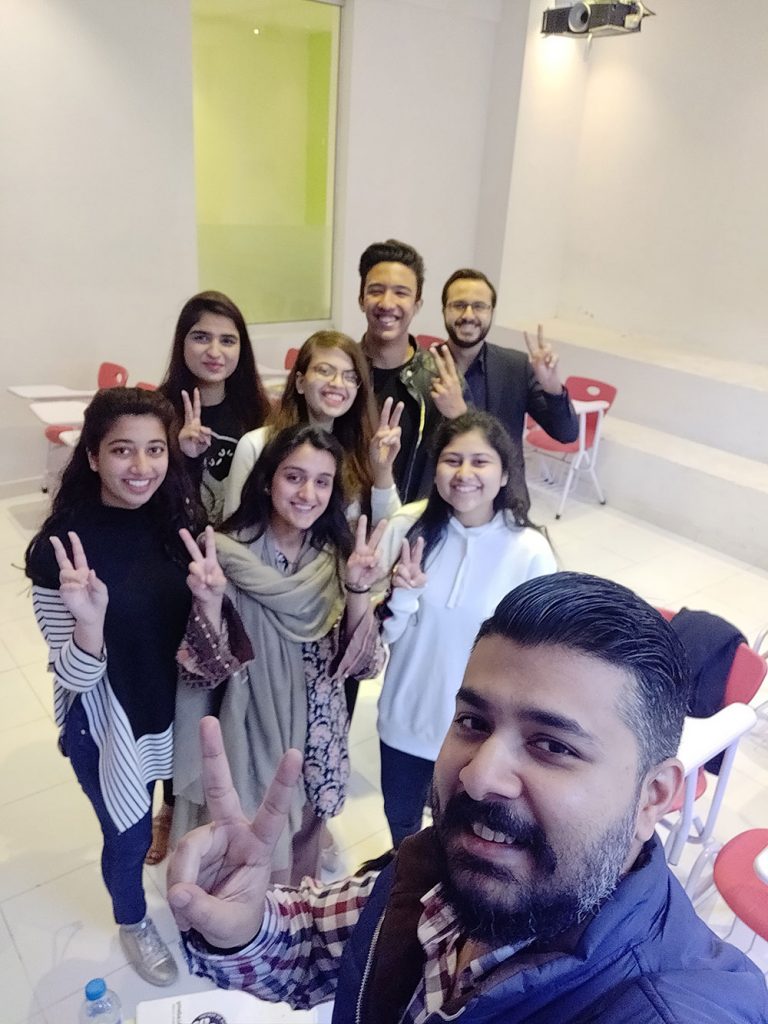Ahmed Waheed is a senior school instructor, teaching mental health courses at Lahore Grammar School. He was also my batch mate at LUMS (Lahore University of Management Sciences). We also worked together in television media and print media – at Express Tribune (in partnership with The New York Times) and DawnNews TV, the first English Language channel of Pakistan. Here he shares his insights on Pakistan’s current education system and how mental health conversations are perceived in Pakistani society, particularly amongst the students.
Since when have you been teaching in Pakistan? Tell us what you teach?
Informally since 2008 but full-time since 2010 so it’s been nine years. I teach A-levels Psychology and Sociology in different schools around Lahore and sometimes online as well. In addition, I regularly engage with my students to talk to them about their career aspirations, their self-esteem and their thinking styles.
What inspired you to be a teacher, particularly in mental health?
I was the Editor Sports for the Express Tribune and always thought our writing would influence public opinion on things that mattered to me – mental health, school culture, learning styles etc. With a receding media industry, I figured I’d make a bigger difference on the front-line itself so I took the plunge into full-time A-levels teaching and it has been nothing short of absolutely rewarding. Students want to learn about these topics and they actually listen with interest as it relates to their own welfare. They even ‘shush’ others when the topics are close to their hearts.
What therefore dragged me into teaching was this drive to make learning in the classroom an ‘effortless’ or ‘natural’ process – students shouldn’t even feel like they are even sitting in a classroom but simply engaging in conversation with each other and the teacher to learn something they came to learn. Personally, I’ve always wanted that kind of environment for myself in school (never got it, we got schooled in the 90s) so I wanted to give it to my students.

What is your take on the current education system? What are some of the gaps/areas of improvement?
I could write a 10,000 word thesis on this topic. We have a three-tier education system in madressahs, Matriculation and Cambridge – all clearly based on the socio-economic class one is born in – all offering vastly different standards of education. On a policy level, the sector is only regulated in terms of fee and some national curriculum but not in terms of quality of content, pedagogy, resources or management. The material in matriculation, catering to the vast majority is outdated by decades. In O/A level-based education, things are a lot better in terms of content and teaching methodology but due to the pressure to get employment later, it is entirely focused on science subjects and is hyper-competitive in terms of grades. A student’s progress gets measured in terms of their number of As and the university they get into.
This competitiveness does have a good side – Pakistani student excel by miles in getting grades and our teachers excel in cracking exam techniques, often resulting in a remarkably high number of high-achievement awards or distinctions (topping a region or the world in a subject). I myself have already had four students getting distinctions in a 9-year career – of which 3 were in a subsequent years from the same classroom in Lahore Grammar School’s 1A1 branch.
But the downside of hyper-competitive, narrow focus system is that it hurts the majority of the students who do not meet arbitrary and unreasonably high academic standards set by their peers. Rather than celebrating their own strengths – sports, debates, language, art, social service or any other ‘unquantified‘ skill – they start to think of themselves as inadequate in terms of getting good grades. They unfortunately get the same message from their parents and peers come result season.
Things are however changing for the better with a few O/A-levels schools taking a notable lead in changing this culture and celebrating and rewarding the skill and mental diversity found in its student body by offering such a range of academic and extra-curricular programs that it often ends up catering to every student’s strength in its entire student body.
Do people talk about mental health openly now than they did around a decade ago? Or is it still a tabooed subject?
This is one achievement that psychologists and teachers in Pakistan are incredibly proud of. Frowned upon or not, the younger generation particularly is talking and learning about mental health in an unprecedented way in our country. But this has not necessarily come from schools but from social media. Schools do give this information to some extent in a formal education setting but social media catalyzed it and turned students into active and equally powerful participants of the conversation on mental health.
So tabooed? Maybe. But the conversation is here to stay for good.
Tell us how you plan on making a change through teaching.
My plan is to educate as many students, as extensively as possible, not only in psychology as a formal subject but also general mental health issues, the impediments to treating it in our country and teach them in a way that they find their strengths and abilities rather than simply narrow them down into a grade category. My second aim is to get them to think critically in both academic and non-academic settings – a skill which is absolutely essential to being a citizen of any modern society but unfortunately not necessarily taught in a grade-focused system.
My effort currently is individual, probably Sisyphean, and on a small-scale but I’m trying to find practical ways of doing this on a much larger scale. Got a long journey ahead that I’m really excited about.
<p style=”display:none;”>Ahmed Waheed, Ahmed Waheed, Ahmed Waheed</p>
